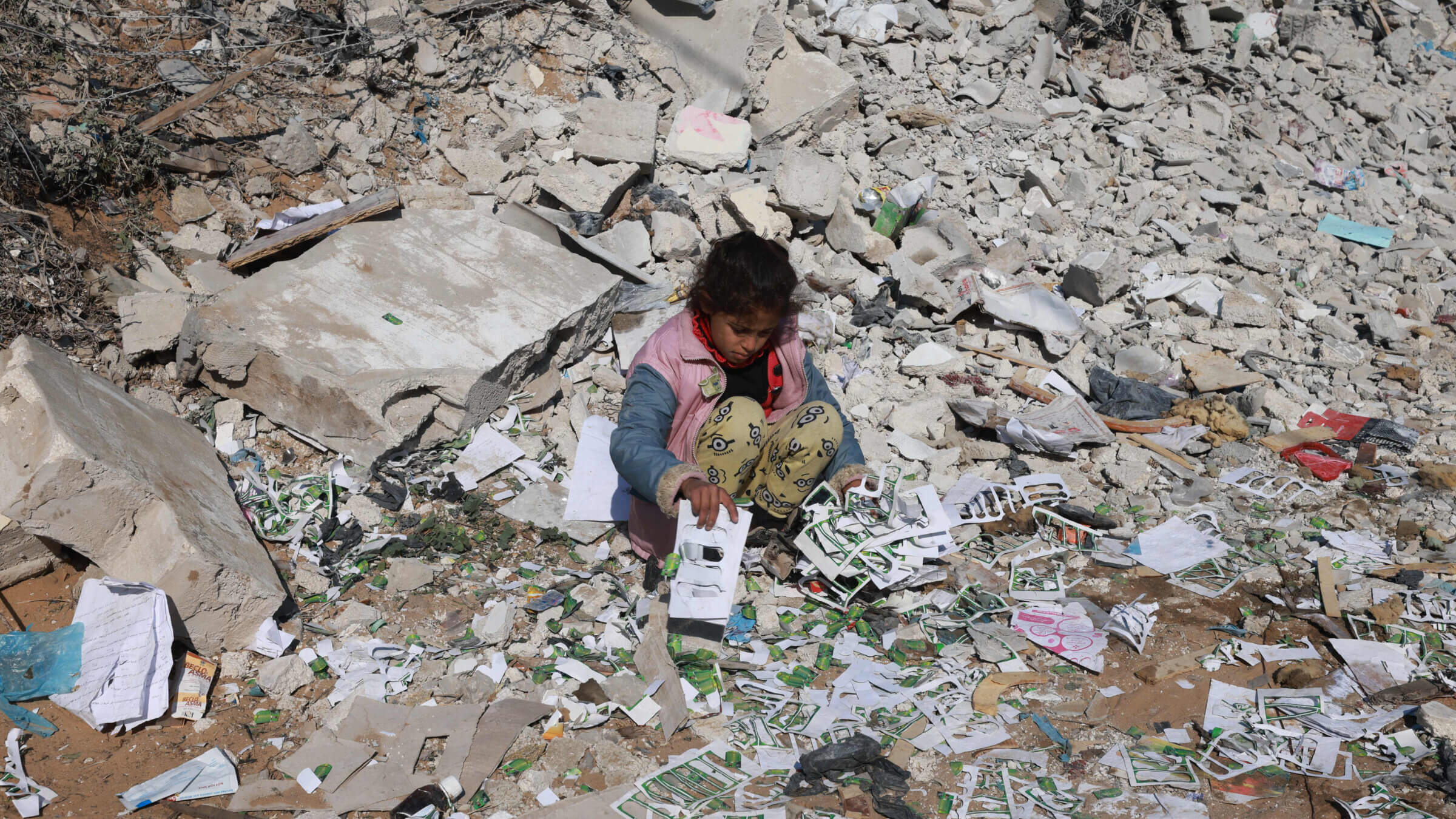Amnesty International makes it crystal clear: Israel is in desperate need of a reality check
Think what you will of genocide allegations; what’s inarguable is that the divide between Israel and the world is growing

A Palestinian girl looks for salvageable items amid the destruction on the southern outskirts of Khan Yunis in Gaza on Jan. 16. Photo by MOHAMMED ABED/AFP via Getty Images
It’s become increasingly clear that Israelis see and process their country’s military assault on Gaza in one way, and much of the rest of the world sees and processes it — and other Israeli actions — in a very different way.
This is not a mere matter of a polite divergence of opinion. It is a vast chasm that will generate increasingly weighty legal and political consequences. Without a significant measure of reality-checking and re-alignment, which is highly unlikely, Israel will find itself more and more isolated in the world. The latest chasm opened up when Amnesty International issued a report on Dec. 5 that declared, “Israel has carried out acts prohibited under the Genocide Convention, with the specific intent to destroy Palestinians in Gaza.”
“Our damning findings must serve as a wake-up call to the international community: this is genocide. It must stop now,” the report concluded.
Many Israelis saw it differently. The local chapter of Amnesty International in Israel held to the view that the high bar for determining genocide had not been met, while also stating that “the scale of the killing and destruction carried out by Israel in Gaza has reached horrific proportions and must be stopped immediately.”
Meanwhile, the Israeli foreign ministry responded with its own polemical shot across the bow: “The deplorable and fanatical organization Amnesty International has once again produced a fabricated report that is entirely false and based on lies.”
But the Amnesty International genocide claim is not a one-off.
On Nov. 21, the International Criminal Court issued arrest warrants for Israeli Prime Minister Benjamin Netanyahu and former Defense Minister Yoav Gallant — whom Netanyahu had fired mere weeks earlier — along with Hamas leader Mohamed Deif, whom Israel believes to be dead. The warrants elicited a predictable response from Netanyahu’s office: “Israel rejects with disgust the absurd and false actions leveled against it by ICC.” The United States chimed in by expressing that it “fundamentally rejects the Court’s decision to issue arrest warrants for senior Israeli officials” based on what it called the prosecutor’s rush to judgment and procedural errors.
The ICC warrants may be the first step toward a new era in the relationship between Israel and the world. Israeli soldiers traveling abroad were recently called home by the IDF to avoid being arrested on charges related to their service in Gaza, based on complaints filed by pro-Palestinian activists. Such a move would previously have been unthinkable; now, Israel clearly senses that the international balance has shifted out of its favor.
It is unsurprising, then, that the U.S. and Netanyahu would join together to oppose both the ICC and Amnesty International’s determinations. But it is essential to note that the Israeli and U.S. governments are outliers in the global order.
It is not just Palestinians and their Arab neighbors who have applauded the ICC’s decision. The European Union, through its foreign minister Josep Borrell — as well as the United Kingdom, and a host of European countries — have declared their intention to uphold the mandate of the ICC in this case. One commentator, Le Monde columnist Stéphanie Maupas, described the decision as “a historic turning point” that indicated that international law was now going to be applied to Western-aligned leaders, and not just figures from the Global South, who account for a large majority of those indicted by the ICC.
The growing divide in how much of the world sees Israel’s actions in Gaza, and how Israel characterizes them, is likely to expand further in coming months and years.
Indeed, Israelis are likely to become more defensive and combative toward the international community,and especially legal institutions such as the ICC. They remain in the throes of the immense trauma triggered by Oct. 7, which has not only caused ongoing pain, grief, and rage, but also prompted profound moral and political blindness. Few Israelis pay attention to the staggering numbers of Palestinians, including tens of thousands of women and children, who have been killed by the IDF in Gaza.
It is perfectly understandable and justifiable that many in the country, with the notable exception of Netanayhu and his far-right supporters, are focused on the return of the long-suffering Israeli hostages as their primary concern. (They are working to realize pidyon shevuyim, the Jewish principle of redeeming those who have been taken captive.) Sadly, they are not able or willing to grasp that Israel’s military campaign has displayed wanton disregard for human life, or that disregard will bring more global condemnation.
The political theorist Michael Walzer has made the essential point that a just war must be waged justly. Yes, Israel had the right to respond to Hamas after the massacre on Oct. 7. That is the first part of the equation. But the second part requires that Israel wage a war that maintains scrupulous adherence to the laws of warfare and international humanitarian law. As many observers have argued, Israel has violated these laws and norms by mass displacement, restricting access to food and other essentials, attacks on mosques, hospitals, and schools, and a repeated failure to distinguish between enemy combatants and innocent civilians.
Israelis now face a profound moment of reckoning. The renowned Russian-Hebrew poet Yehuda Leib Gordon opened a famous 1863 poem by addressing the Jewish people: “Awake, my people! How long will you sleep?” It is now time for Israelis — and their American supporters — to awaken to the realization that their view of reality is grossly distorted. They must re-align their values and understanding of human rights with the rest of the world — or they, not just their leaders, will continue to face ever-intensifying consequences from the international community.
















